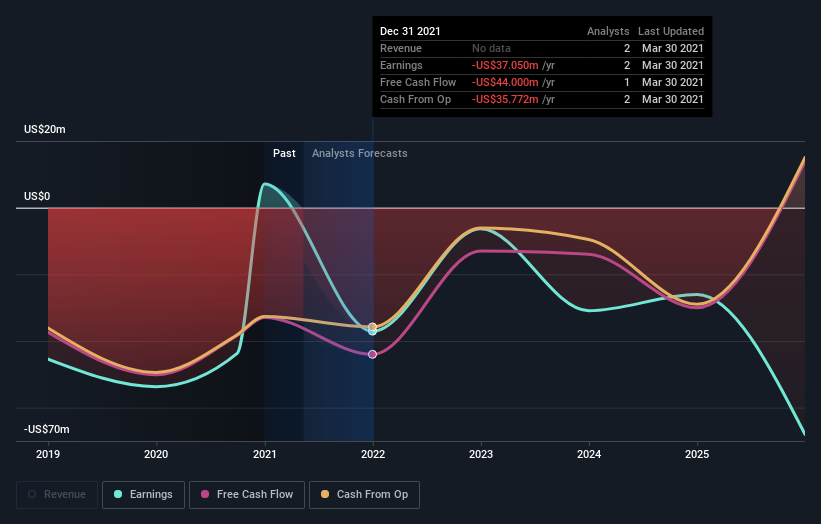How Many Decibel Therapeutics, Inc. (NASDAQ:DBTX) Shares Do Institutions Own?
The big shareholder groups in Decibel Therapeutics, Inc. (NASDAQ:DBTX) have power over the company. Insiders often own a large chunk of younger, smaller, companies while huge companies tend to have institutions as shareholders. We also tend to see lower insider ownership in companies that were previously publicly owned.
Decibel Therapeutics is a smaller company with a market capitalization of US$182m, so it may still be flying under the radar of many institutional investors. Taking a look at our data on the ownership groups (below), it seems that institutional investors have bought into the company. Let's delve deeper into each type of owner, to discover more about Decibel Therapeutics.
View our latest analysis for Decibel Therapeutics
What Does The Institutional Ownership Tell Us About Decibel Therapeutics?
Many institutions measure their performance against an index that approximates the local market. So they usually pay more attention to companies that are included in major indices.
As you can see, institutional investors have a fair amount of stake in Decibel Therapeutics. This implies the analysts working for those institutions have looked at the stock and they like it. But just like anyone else, they could be wrong. If multiple institutions change their view on a stock at the same time, you could see the share price drop fast. It's therefore worth looking at Decibel Therapeutics' earnings history below. Of course, the future is what really matters.
Our data indicates that hedge funds own 7.2% of Decibel Therapeutics. That's interesting, because hedge funds can be quite active and activist. Many look for medium term catalysts that will drive the share price higher. The company's largest shareholder is OrbiMed Advisors LLC, with ownership of 20%. Meanwhile, the second and third largest shareholders, hold 13% and 8.7%, of the shares outstanding, respectively.
Our research also brought to light the fact that roughly 57% of the company is controlled by the top 5 shareholders suggesting that these owners wield significant influence on the business.
Researching institutional ownership is a good way to gauge and filter a stock's expected performance. The same can be achieved by studying analyst sentiments. While there is some analyst coverage, the company is probably not widely covered. So it could gain more attention, down the track.
Insider Ownership Of Decibel Therapeutics
The definition of company insiders can be subjective and does vary between jurisdictions. Our data reflects individual insiders, capturing board members at the very least. Company management run the business, but the CEO will answer to the board, even if he or she is a member of it.
Insider ownership is positive when it signals leadership are thinking like the true owners of the company. However, high insider ownership can also give immense power to a small group within the company. This can be negative in some circumstances.
Our most recent data indicates that insiders own less than 1% of Decibel Therapeutics, Inc.. It has a market capitalization of just US$182m, and the board has only US$994k worth of shares in their own names. I generally like to see a board more invested. However it might be worth checking if those insiders have been buying.
General Public Ownership
The general public holds a 18% stake in Decibel Therapeutics. While this size of ownership may not be enough to sway a policy decision in their favour, they can still make a collective impact on company policies.
Private Equity Ownership
Private equity firms hold a 39% stake in Decibel Therapeutics. This suggests they can be influential in key policy decisions. Some might like this, because private equity are sometimes activists who hold management accountable. But other times, private equity is selling out, having taking the company public.
Public Company Ownership
We can see that public companies hold 8.4% of the Decibel Therapeutics shares on issue. This may be a strategic interest and the two companies may have related business interests. It could be that they have de-merged. This holding is probably worth investigating further.
Next Steps:
It's always worth thinking about the different groups who own shares in a company. But to understand Decibel Therapeutics better, we need to consider many other factors. For example, we've discovered 2 warning signs for Decibel Therapeutics (1 is a bit unpleasant!) that you should be aware of before investing here.
If you would prefer discover what analysts are predicting in terms of future growth, do not miss this free report on analyst forecasts.
NB: Figures in this article are calculated using data from the last twelve months, which refer to the 12-month period ending on the last date of the month the financial statement is dated. This may not be consistent with full year annual report figures.
This article by Simply Wall St is general in nature. It does not constitute a recommendation to buy or sell any stock, and does not take account of your objectives, or your financial situation. We aim to bring you long-term focused analysis driven by fundamental data. Note that our analysis may not factor in the latest price-sensitive company announcements or qualitative material. Simply Wall St has no position in any stocks mentioned.
Have feedback on this article? Concerned about the content? Get in touch with us directly. Alternatively, email editorial-team (at) simplywallst.com.


